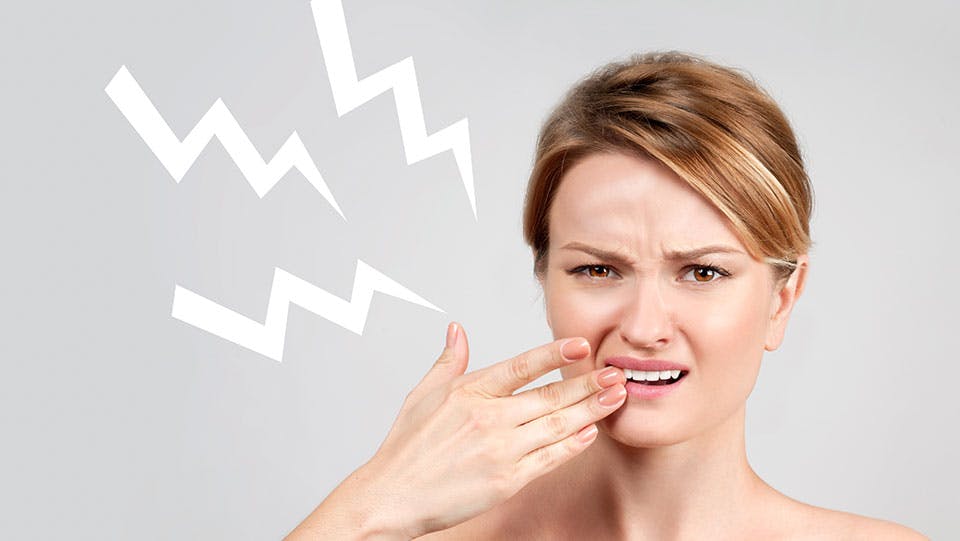
Everyone wants a beautiful smile, so you may consider teeth whitening products or even visiting your dentist for professional whitening treatments. But some products may cause sensitive teeth after whitening. In fact, over-the-counter teeth whitening kits commonly cause temporary tooth sensitivity.1 This sensitivity may occur during your treatment or when consuming hot or cold beverages. Here is some information on why teeth whitening treatments can cause temporary sensitivity and how to manage it.
What Causes Sensitive Teeth After Whitening?
Many people seek out teeth whitening treatments due to staining or discoloration. This discoloration can occur from drinking coffee, tea, or wine, or from smoking cigarettes. Some medications may even cause discoloration.2 But both over-the-counter whitening treatments and professional treatments can cause sensitivity.
Consider the structure of teeth. Teeth have three layers:4
- Enamel – The crown’s outermost layer
- Dentin – Middle layer, which is harder than bone
- Pulp – Inner layer of the tooth than contains nerves and blood vessels
When whitening treatments cause sensitivity, it is because of the bleaching agent in the treatment. All forms of tooth bleaching may cause inflammation to the pulp, which results from exposure to peroxide.1 Higher concentrations of bleaching agents like carbamide and hydrogen peroxide have been shown to cause greater sensitivity.1 Fortunately, this sensitivity is temporary, especially once you discontinue use of the treatment.1
If you’re experiencing mouth irritation after using an at-home whitening kit, it may have to do with your gums rather than your teeth. At-home teeth whitening kits frequently come with gel trays that may cause irritation to the gums if the trays do not fit properly or the treatment is not correctly applied.1
If you’re experiencing tooth sensitivity while you’re whitening your teeth at home, you should stop treatment and contact your dental professional. The higher the concentration of hydrogen peroxide in the treatment, the less time you should use the treatment. Professional treatments applied in the dental office may have additional ingredients to combat tooth sensitivity, including fluoride and potassium nitrate.1
What Are Symptoms of Sensitive Teeth?
If you’ve never experienced sensitive teeth after whitening before, you may not be sure what the sensation means. Sensitivity usually manifests as a short, sharp sensation while brushing, eating or drinking.3 However, tooth sensitivity after whitening may feel different. Talk to your dentist about what to expect when getting your teeth whitened.
How Do You Treat Teeth Sensitivity After Whitening?
There are a few tips and tricks that may help alleviate some sensitivity after whitening. However, it’s important to talk to your dentist about teeth sensitivity and any new products or treatments you’re interested in trying. Make sure you check in with your oral healthcare provider before trying any of the following.
Ask your dentist about potassium nitrate and sodium fluoride gel
Some studies are exploring applying 5% potassium nitrate and 2% sodium fluoride gel before a whitening treatment to help combat sensitivity.1 However, research on the effectiveness of this method is still ongoing.1
Try a desensitizing toothpaste
If you have sensitivity before you start whitening, it is recommended to use a desensitizing toothpaste two weeks prior to your at-home whitening treatment, as well as continued use during and after whitening treatment. Talk to your dentist about using a desensitizing toothpaste to help relieve sensitivity after whitening.6
Switch to a soft-bristled brush
Whether or not you’ve just had a whitening treatment, using a soft-bristled toothbrush is your best bet when it comes to brushing your teeth.7 Brushing with a toothbrush with firmer bristles—especially if you’re brushing too vigorously—can lead to further damage to your gums and tooth enamel.7
Avoid cold beverages—or drink through a straw
Whitening treatments may leave teeth sensitive to cold temperatures during or after the whitening procedure.8 Avoid eating or drinking anything cold to avoid discomfort caused by extreme temperatures. If you absolutely have to drink an ice-cold beverage, sip it through a straw to avoid contact with your teeth.
How Do You Prevent Sensitive Teeth During Whitening Treatments?
In addition to considering the above tips for helping your sensitive teeth after whitening, you can take some steps to prevent some of the sensitivity. Ask your dentist about using a teeth whitening product with a lower concentration of hydrogen peroxide for in-office treatments. The lower the hydrogen peroxide concentration, the longer you’ll need to use the product, but you will likely experience less sensitivity because of it.1 It’s also recommended that you speak to your dentist if you are experiencing recurring sensitivity.
SOURCES
- Oral Health Topics: Whitening. ADA. https://www.ada.org/en/member-center/oral-health-topics/whitening. Accessed 9/8/2021.
- Whitening: 5 Things to Know About Getting a Brighter Smile. Mouth Healthy by the American Dental Association. https://www.mouthhealthy.org/en/az-topics/w/whitening. Accessed 9/8/2021.
- Sensitive teeth. Oral Health Foundation. https://www.dentalhealth.org/sensitive-teeth. Accessed 1/3/2021.
- Cavities: What are They and How Do We Prevent Them? Mouth Healthy by the American Dental Association. https://www.mouthhealthy.org/en/dental-care-concerns/how-do-we-prevent-cavities. Accessed 1/3/2021.
- NSAIDs (nonsteroidal anti-inflammatory drugs). American College of Rheumatology. https://www.rheumatology.org/I-Am-A/Patient-Caregiver/Treatments/NSAIDs. Accessed 8/26/2022.
- Preventing and treating tooth sensitivity. MouthHealthy. https://www.mouthhealthy.org/~/media/ADA/Publications/Files/FTDP_Sept2013_2.pdf?la=en.
Accessed 8/26/2022. - 10 Things You Didn’t Know About Your Toothbrush. MouthHealthy. https://www.mouthhealthy.org/en/az-topics/t/toothbrushes. Accessed 8/26/2022.
- Tooth whitening. Oral Health Foundation. https://www.dentalhealth.org/tooth-whitening. Accessed 8/26/2022.




